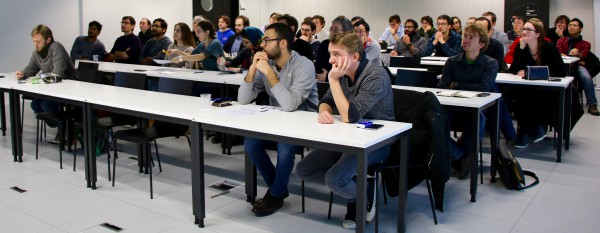MARVEL Junior Seminar — March 2018
The MARVEL Junior Seminars aim to intensify interactions between the MARVEL Junior scientists belonging to different research groups located at EPFL. The EPFL community interested in MARVEL research topics is very welcome to attend. We believe that these events will be central for establishing a vibrant community.
Each seminar consists of two presentations of 25 minutes each, allowing to present on a scientific question in depth, each presentation being followed by 10 minutes for discussion. The discussion is facilitated and timed by the chairperson of the day whose mission is to ensure active lively interactions between the audience and the speakers.
Pizza is served as of 11:45 in the MED hall (floor 0), and after the seminar at 13:30 you are cordially invited for coffee and dessert to continue discussion with the speakers.

MARVEL Junior Seminar Organizing Committee — Ariadni Boziki, Francesco Ambrosio, Davide Campi, Sandip De, Gloria Capano, Michele Pizzochero, Quang Van Nguyen, Kun-Han Lin, Francesco Maresca and Nathalie Jongen
Check the list of the next MARVEL Junior Seminars here.
Abstract — First-principles calculations of halide perovskites - Marko Mladenovic
Halide perovskites have gained large interest during the last years due to their rapidly growing solar cell photoconversion efficiency. However, it is still challenging to find a perovskite compound which provides high efficiency and good stability at the same time. We present results obtained by first-principles calculations of halide perovskites. In particular, we propose a route for band gap tuning and we rationalize effective mass dependence on chemical composition of halide perovskites. In addition, we explain unusual band gap trend in formamidinium lead-tin bromides. Finally, we apply first-principle calculation to investigate interface between perovskites and electron transporting materials and to calculate NMR chemical shifts.
Abstract — Tackling performance engineering in Computational Material Science - Nicola Varini
In this presentation I will show different tools aimed to make the numerical simulations sustainable on modern HPC ecosystem.
Firstly, I will present spack (https://github.com/spack/spack/blob/develop/lib/spack/docs/index.rst). This tools is designed to support multiple versions and configurations of software on a wide variety of platforms and environments. It was designed for large supercomputing centers, where many users and application teams share common installations of software on clusters with exotic architectures, using libraries that do not have a standard ABI.
Secondly, I will introduce an AiiDA workflow aimed to provide performance related information on selected test cases. With the help of profilers like Intel Parallel Studio(https://software.intel.com/en-us/parallel-studio-xe) it is possible to explore in depth the behavior of the application on a given testcase/hardware. The AiiDA ecosystem allows this kind of analysis in a high-throughput fashion.
Low-volume newsletters, targeted to the scientific and industrial communities.
Subscribe to our newsletter